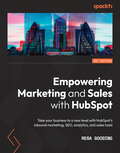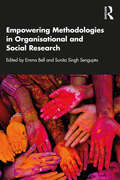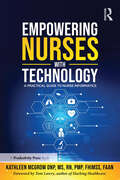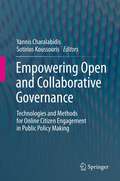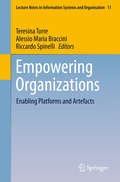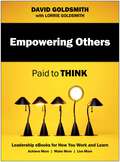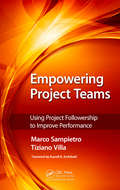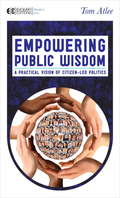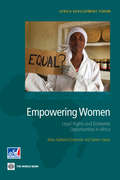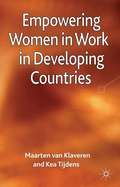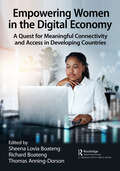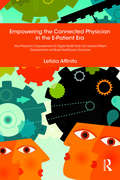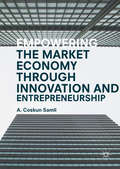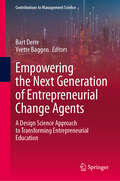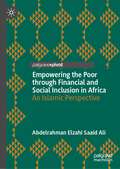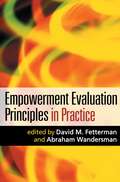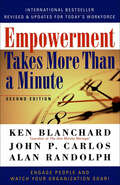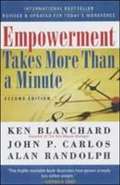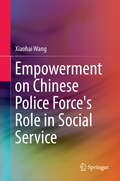- Table View
- List View
Empowering Marketing and Sales with HubSpot: Take your business to a new level with HubSpot's inbound marketing, SEO, analytics, and sales tools
by Resa GoodingLeverage HubSpot to reach your target audience with the right content and convert them into loyal customersKey FeaturesExplore a full software stack for marketing, sales, and customer services to grow your businessUnderstand how to organize, track, and build better relationships with leads and customersLearn to prioritize and execute your marketing tasks in an efficient wayBook DescriptionEmpowering Marketing and Sales with HubSpot is your comprehensive solution to using HubSpot to achieve your business goals with a flexible and lean approach. With this book, you'll implement out-of-the-box solutions provided by HubSpot for sales and marketing professionals using all the tools needed to effectively manage your business campaigns, sales, and marketing automation processes.This book will take you through steps to ensure your investment in HubSpot pays off from Day 1. You'll learn how to set up HubSpot correctly and understand how to generate quick wins for your organization. Next, you will work with important HubSpot tools for SEO, social media, and ads. The book will also show you how to use HubSpot for conversational marketing and create a marketing funnel using HubSpot's lead capture and engagement tools. In addition to this, you will get to grips with building custom reports, dashboards, and notifications to stay on top of company marketing goals. Later, you will learn how to use HubSpot for inbound marketing and for every type of business, such as manufacturing, agriculture, and eCommerce.By the end of this HubSpot book, you will have the skills you need to be able to set up effective marketing campaigns and leverage the insights gleaned from sales efforts using just one platform.What you will learnExplore essential steps involved in implementing HubSpot correctlyBuild ideal marketing and sales campaigns for your organizationManage your sales process and empower your sales teams using HubSpotGet buy-in from your management and colleagues by setting up useful reportsUse Flywheel strategies to increase sales for your businessApply the inbound methodology to scale your marketingRe-engage your existing database using the HubSpot retargeting ads toolUnderstand how to use HubSpot for any B2B industry in which you operateWho this book is forThis HubSpot marketing book is for sales and marketing professionals, business owners, and entrepreneurs who want to use HubSpot for scaling their sales and marketing activities. A basic understanding of key marketing terms is required to get started with this book.
Empowering Methodologies in Organisational and Social Research
by Emma Bell Sunita Singh SenguptaThis book explores the meaning and practice of empowering methodologies in organisational and social research. In a context of global academic precarity, this volume explores why empowering research is urgently needed. It discusses the situatedness of knowing and knowledge in the context of core-periphery relations between the global North and South. The book considers the sensory, affective, embodied practice of empowering research, which involves listening, seeing, moving and feeling, to facilitate a more diverse, creative and crafty repertoire of research possibilities. The essays in this volume examine crucial themes including: · How to decolonise management knowledge · Using imaginative, visual and sensory methods · Memory and space in empowering research · Empowerment and feminist methodologies · The role of reflexivity in empowering research By bringing postcolonial perspectives from India, the volume aims to revitalise management and organisation studies for global readers. This book will be useful for scholars and researchers of management studies, organisational behaviour, research methodology, development studies, social sciences in general and gender studies and sociology.
Empowering Nurses with Technology: A Practical Guide to Nurse Informatics
by Kathleen McGrowNursing informatics is the specialty that integrates nursing science with multiple information management and analytical sciences to identify, define, manage, and communicate data, information, knowledge, and wisdom in nursing practice. It allows nurses to deliver evidence-based and patient-centered care, improve human health, and advance medical research. It also enhances clinical workflows so that nurses and other personnel can care for patients more efficiently and effectively.Some of the benefits of nursing informatics include a reduction in medical errors, lowered costs, improved nurse productivity, and better care coordination among nurses, physicians, pharmacists, and others throughout various care stages. Empowering Nurses with Technology: A Practical Guide to Nurse Informatics is a comprehensive guidebook for nurses and healthcare professionals looking to understand the role of technology in modern nursing practices. This book covers the basics of healthcare technology, including electronic health records (EHRs), telehealth, and mobile health applications. This book offers practical advice for implementing technology in nursing workflows, as well as strategies for training and engaging nursing staff in the use of new technology. It also explores the impact of technology on patient care and outcomes, discussing topics such as patient safety, privacy, and data security.This book provides a useful resource for nurses seeking to leverage technology to improve the quality and efficiency of their care while also enhancing their professional development and job satisfaction.
Empowering Open and Collaborative Governance: Technologies and Methods for Online Citizen Engagement in Public Policy Making
by Yannis Charalabidis Sotirios KoussourisThe use of information and communication technologies to support public administrations, governments and decision makers has been recorded for more than 20 years and dubbed e-Government. Moving towards open governance roadmaps worldwide, electronic participation and citizen engagement stand out as a new domain, important both for decision makers and citizens; and over the last decade, there have been a variety of related pilot projects and innovative approaches. With contributions from leading researchers, Charalabidis and Koussouris provide the latest research findings such as theoretical foundations, principles, methodologies, architectures, technical frameworks, cases and lessons learnt within the domain of open, collaborative governance and online citizen engagement. The book is divided into three sections: Section one, "Public Policy Debate Foundations," lays the foundations regarding processes and methods for scoping, planning, evaluating and transforming citizen engagement. The second section, "Information and Communication Technologies for Citizen Participation," details practical approaches to designing and creating collaborative governance infrastructures and citizen participation for businesses and administrations. Lastly, the third section on "Future Research Directions of Open, Collaborative ICT-enabled Governance" provides a constructive critique of the developments in the past and presents prospects regarding future challenges and research directions. The book is mainly written for academic researchers and graduate students working in the computer, social, political and management sciences. Its audience includes researchers and practitioners in e-Governance, public administration officials, policy and decision makers at the local, national and international level engaged in the design and creation of policies and services, and ICT professionals engaged in e-Governance and policy modelling projects and solutions.
Empowering Organizations
by Teresina Torre Alessio Maria Braccini Riccardo SpinelliThis book presents a collection of original research papers focusing on the enabling aspects of Information and Communication Technologies. In particular, it focuses on the two topics of digital platforms and digital artefacts, and discusses their role in enabling organizations to achieve specific goals, to exploit innovative value propositions, or to leverage innovative coordination mechanisms. Adopting a multidisciplinary perspective on a variety of information systems topics, the book offers interesting insights for IS managers, business managers, and policymakers alike. It is based on a selection of the best research papers - original double-blind peer-reviewed contributions - presented at the annual conference of the Italian chapter of the AIS, held in Genoa (Italy) in November 2014.
Empowering Others: Paid to Think
by David GoldsmithThe reality is you can't do everything on your own; you need other people to achieve results. Without realizing it, most leaders are the cause of underperformance and low productivity within their organizations despite their experience and intentions to have the opposite effect. Now, learn the step-by-step methodology and your exact role in the empowerment process that will ready your people to handle the authority and responsibilities you transfer to them.
Empowering Project Teams: Using Project Followership to Improve Performance
by Tiziano Villa Marco SampietroExamining the project environment from the perspective of project team members, this book re-interprets project management methodologies and behaviors using a bottom-up approach. It explores the application of project followership in the key stages of project management and details the methods and techniques that all project team members need to know. Outlining the behaviors team members should adopt for project success, the text considers project closure and transfer and explains why this is an ideal time to evaluate if efforts invested have been rewarded.
Empowering Public Wisdom
by Tom AtleeLifelong activist Tom Atlee proposes innovative ways to distill the wisdom of ordinary people in order to better guide public policy. In Empowering Public Wisdom, Atlee recognizes currently popular forms of progressive democracy advocates, such as citizen participation and voter education, but suggests that what is really needed is a re-thinking of the very concept of democracy; Atlee advocates the use of "public wisdom," a collective intelligence that can be drawn upon to guide public policy and action. Reaching beyond partisan politics, Atlee explores how a diversity of views can be engaged around public issues in ways that generate a coherent, shared "voice of the people" that takes most or all of the population's perspectives and needs into account. Atlee's core approach is through "citizen deliberative councils," in which a small group of people randomly selected creates a "mini-public" or a microcosm of the larger population. Citizen councils engage in the study of a public issue and make recommendations to public officials and the community, but disband afterward; when a new issue arises, a new council is formed. Ultimately, Atlee aims even higher, suggesting a possible fourth branch of government to better balance our current democratic system. Combining a radical vision with practical solutions, Empowering Public Wisdom provides a unique and refreshing voice in the political arena.Empowering Public Wisdom is part of the EVOLVER EDITIONS Manifesto Series.From the Trade Paperback edition. on co-intelligence holds some of the keys to enabling us to work with the ever-more complex opportunities in human existence." -- Robert Theobald, author of Turning the Century and The Rapids of Change"Tom Atlee is a unique soul who is fostering the awakening of our collective wisdom."-- Duane Elgin, author of Voluntary Simplicity and Promise Ahead"Tom Atlee's work is an important contribution to the world I want to create." -- Stewart Levine, Esq, author of Getting to Resolution and The Book of Agreement
Empowering SME Managers in Palestine
by Farhad Analoui Mohammed Al-MadhounSMEs create employment, wealth and a potential for future growth. In Palestine they can also mean survival and freedom. In Palestine they are not a choice but a necessity for sustainable development. But by their nature SMEs are vulnerable in a business environment characterized by uncertainty. To give the managers of SMEs in Palestine a realistic chance of success they need training to enable them to meet the challenge of running their enterprises effectively. Drawing on original research undertaken within Palestine this book explores how the challenge is being met (and considers how it might be even more successfully met) by enabling and empowering the owners and managers of these pioneering businesses.
Empowering Women
by Mary Hallward-Driemeier Tazeen HasanThe importance of property rights in providing the incentive to invest, work hard, and innovate has been recognized for centuries. Yet, many women in Africa do not have the same property rights or formal legal capacity enjoyed by men. Empowering Women: Legal Rights and Economic Opportunities in Africa documents the extent to which the legal capacity and property rights vary for women and men, and analyzes the impact this has on women's economic opportunities. The book introduces the "Women's Legal Economic Empowerment Database - Africa (Women LEED Africa). " This database covers all 47 countries in Sub-Saharan Africa, providing indicators and links to constitutions, ratified international conventions, and domestic statutes where there are gender gaps in legal capacity and property rights. It shows how and where, despite universal constitutional recognition of non-discrimination, many countries have exceptions in areas of marriage, ownership, and control over property and inheritance. With less secure property rights, women in these countries do not have the same ability - or incentive - to accumulate and control assets and thus to access finance or to grow their businesses. After laying out the various gender gaps in legal capacity and property rights, the book addresses the additional challenges stemming from legal systems with a multiplicity of sources of law. Overlapping legal systems themselves add uncertainty to defining women's economic rights. The authors use case law to trace out the implications for women's rights and to provide examples of effective reforms. The book recognizes that beyond de jure differences, women may face greater practical constraints in having their rights protected. This book spells out specific steps that can be taken to address gender gaps both in formal property rights and in practical constraints in accessing justice.
Empowering Women in Work in Developing Countries
by Maarten Van Klaveren Kea TijdensPresents the outcomes of a major 14-country project aimed at empowering girls and young women. Provides a discussion of their choices in life, comparing factors such as family background, health, education, employment opportunities and the use of and access to the internet.
Empowering Women in the Digital Economy: A Quest for Meaningful Connectivity and Access in Developing Countries
by Richard Boateng Thomas Anning-Dorson Sheena Lovia BoatengThis book presents multidisciplinary perspectives on opportunities and best practices necessary for empowering women in the digital economy in developing countries. The book explores the components of connectivity that matter most to women. It also helps decision-makers and policymakers to adopt the policies needed to empower women in using digital platforms and developing (and taking up) careers in the digital economy in developing economies. In response, we gathered eight contributions (or chapters) on new directions, strategies, and barriers to women’s empowerment through digital technologies. The contributions span thematic areas such as female digital entrepreneurship, social media, and agricultural value chains, women in the gig economy, the digital divide, gender disparities in cryptocurrencies, and digital access in agriculture. In précis, the contributions argue that, first, appropriate legislation matters, but it is not enough – there is a need to alter social and cultural attitudes and raise awareness. Second, there is a need to address affordability. Government and development agencies may begin by offering free or discounted smart devices to rural women and appropriate digital skills training relevant to their economic activities. Third, there is a need for urgent attention by government labor agencies in developing countries to enforce decent working conditions and protection for female gig workers while maximizing opportunities being offered through these platforms. Don’t just leave women to use digital platforms and services; support them with sound policies and programs for responsible and sustainable use. In effect, this book offers clarity on new strategies, case studies/examples, and lessons in addressing or circumventing institutional challenges to women’s empowerment through digital technologies.
Empowering the Connected Physician in the E-Patient Era: How Physician’s Empowerment On Digital Health Tools Can Improve Patient Empowerment and Boost Health(care) Outcomes
by Letizia AffinitoThe constantly evolving digital world must be used in the practice of medicine to improve the care of patients. However, the only way to do so effectively is via evidence-based, meaningful and strategic use. Empowering the Connected Physician in the E-Patient Era provides practical guidance in this mission and is thus essential reading for all health stakeholders looking into approaching this. Drawing on the author’s research and consulting practice, as well as on the practical experience of managers in medium-large organizations worldwide, the book will provide a proven framework to improve the development and implementation of physicians’ empowering digital programs in these organizations, a step-by-step guide for how companies can develop and implement programs aiming at empowering physicians while empowering patients. It is an engaging how-to/how-not-to book which will include tips, advice and critical reviews that every stakeholder must have in order to participate in the evolving healthcare system and be more active in making strategic patient-centered choices. This book will help healthcare organizations chart a course within this new territory and thereby improve their ability to engage with empowered patients.
Empowering the Market Economy through Innovation and Entrepreneurship
by A. Coskun SamliThis book argues that the strength of our dynamic society is a market economy, which functions well only if positive and constructive marketing practices are performed. It offers innovative alternatives for achieving economic progress and outlines strategies to create conditions for equal opportunity. The American economy has transitioned from a "survival of the fittest" to "survival of the fattest" mentality, focusing less on the people and quality of life and more on the amount of dollars to be gained. The divide between the 1% and 99% leaves lower-income individuals at a significant disadvantage and threatens both economic and societal advancement. The author offers clear, intelligible solutions to accomplish this such as eliminating discrimination, providing opportunities for new ideas and industries, enhancing quality of life, and encouraging more competition so that radical innovations can emerge and make a positive difference. This book will appeal to leaders and researchers across marketing, economics, management, and accounting looking for answers on how to get the American economy back on track.
Empowering the Next Generation of Entrepreneurial Change Agents: A Design Science Approach to Transforming Entrepreneurial Education (Contributions to Management Science)
by Bart Derre Yvette BaggenIn an era defined by volatility, complexity, and uncertainty, educating future-oriented change agents is essential to address pressing societal challenges such as climate change and the transition to a circular economy. These change agents play a pivotal role in driving societal transformation, requiring a mindset and skills suited to navigating complex problems and adapting to environments full of uncertainty. Entrepreneurial education emerges as a critical lever in fostering such capabilities, integrating seamlessly into higher education and lifelong learning contexts to prepare change agents for active, constructive participation in societal transitions. This book introduces a design-science research approach to entrepreneurial education, emphasizing the design, implementation, and evaluation of educational practices tailored to diverse contexts. Real-life case studies illustrate how the design-science approach has been successfully applied, offering practical insights for educators and researchers aiming to enhance their own research and teaching practices. By connecting theory to practice, the design-science approach offers a fresh perspective on entrepreneurial education. It not only unpacks the mechanisms behind effective program design but also fosters innovation through continuous, data-driven cycles of collecting and processing feedback. This approach ultimately enables the development of evidence-based entrepreneurial education that prepares change agents capable of driving the necessary societal transformation across contexts.
Empowering the Poor through Financial and Social Inclusion in Africa: An Islamic Perspective
by Abdelrahman Elzahi Saaid AliThis book discusses financial inclusion, gender equality, regulatory regimes for microfinance, women empowerment, and digital finance from an Islamic perspective. It encourages the reader to reflect on whether the delivery of financial services from an Islamic perspective might be attainable and lead to achieving global financial inclusion. Accessing financing is one of the most formidable challenges facing disadvantaged in IsDB member countries. The race to serve these niche markets has led to the emergence of conventional microfinance. There remains the lingering question of whether conventional microfinance in its current form has conclusively led to poverty alleviation among Muslim communities. Hence, there is a need of having Shari’ah-compliant business model that depends on Islamic socio-economic tools such as Zakah, Sadaqah, and Waqf might best address the needs self-financial exclusion or the exclusion of the extremely poor in Muslim.
Empowering you, empowering her
by Marty Seldman Paula Santilli Mónica BauerLet’s be a force that brings development and equality to women worldwide by helping them realize their professional goals! Women’s economic power is critical to the pressing recovery of the global economy. PepsiCo’s LatAm executives Paula Santilli and Mónica Bauer, together with business coach Marty Seldman, know that unleashing that power is not easy—women today face many challenges in their social, economic, and work environments. This is why with this book they aim to raise women’s self-confidence, by giving them the necessary tools to stimulate their personal and professional development. Their twelve rules will unlock women’s full potential by helping women better understand their power, feel comfortable using it, and not give it away. The Twelve Rules Study power Detect to protect Use your power; don’t give it away Build and leverage your network Know your buzz Focus on the real scorecard Promote yourself with sufficient boldness Increase your value to the organization Enhance your executive presence Protect yourself from sabotage and marginalization Develop healthy selfishness Control your calendar and commitments The rules are illustrated by inspiring stories from PepsiCo women associates all across the globe who have put these rules into practice. Prompts and activities help readers immediately start applying the rules to their current situation. The goal is not only to inspire women to reach their potential but also to empower other women along the way.
Empowerment Effort That Came Undone (HBR Case and Commentary)
by J. Richard Hackman Lawrence R. Rothstein Mary V. Gelinas Elios Pascual W. Alan Randolph Roger G. JamesGeorge Marlow, a manufacturing vice president at SportsGear, had been looking forward to this month's companywide meeting. Martin Griffin, SportsGear's CEO, was going to announce a new era of empowerment at the company. And as Martin gave his speech, he seemed to fill the entire auditorium with his enthusiasm. But Harry Lewis, a SportsGear veteran of more than 20 years, was not so sure. "What in the world does empowerment mean?" he asked. And indeed, Harry's concerns proved well founded. George led the team from manufacturing that was to be the test case for implementing empowerment at SportsGear. The team began the project in high spirits, eager to accomplish its goals. But when the time came to present their reports, the members were shocked: Martin was called away from the meeting, and the department heads formed a wall of resistance. It appeared that the team's efforts had been a waste of time. Can empowerment work at SportsGear? In 95111 and 95111Z, J. Richard Hackman, Elios Pascual, Mary V. Gelinas, Roger G. James, and W. Alan Randolph offer advice on this fictional case study.
Empowerment Evaluation Principles in Practice
by David FettermanWhat principles should guide an empowerment evaluation? And how can these principles actually be put into practice? One of the primary tasks in an empowerment evaluation (EE) is to increase the capacity of program stakeholders to plan, implement, and evaluate their own programs. This book presents the most current formulation of the 10 principles of EE and provides professionals and students with the tools to put these principles into practice. Through case studies of diverse evaluation projects--including community health foundation initiatives, school district programs, and a $15 million corporate program aimed at bridging the digital divide--the founder and leading proponents of EE clarify key concepts and discuss important lessons learned. Coverage includes how to balance program improvement efforts with accountability requirements; how EE can be used to guide standards-based work; how to use EE in a learning organization; the differences among empowerment, collaborative, and participatory evaluation; and much more.
Empowerment Takes More Than a Minute: Second Edition
by Ken Blanchard Alan Randolph John P. Carlos&“The most truthful, straight-talk book on managing people to come along in eons. This is an exceptional tool for business.&” —Harvey MacKay, #1 New York Times-bestselling author In the newly updated edition of this classic empowerment business fable—over 400,000 copies sold—Ken Blanchard, John Carlos, and Alan Randolph show you how to shift to an empowered, employee-driven work environment. Empowerment Takes More Than a Minute tells the story of a young manager whose attempts to turn his troubled company around through traditional top-down, command-and-control management are failing. Reluctantly, he contacts an expert in empowerment, even though he feels like he&’s already tried that approach. Step by step, the expert helps him understand why his past and present efforts have fallen short and figure out what he needs to do to create an empowered workforce. The process as it unfolds is complex, paradoxical, and counterintuitive—but well worth the effort. This new edition dispels the notion that empowerment is a bygone fad. No matter what its name, the essential concept—that organizations can achieve extraordinary results by recognizing and taking advantage of the skills, experience, and knowledge already existing in the organization—will always be relevant. Although sometimes arduous, the journey to empowerment is well worth embarking on. In fact, unleashing the power of people in an organization may be the only way to continue to do business in a competitive, complicated marketplace. &“One of the very best organized, thought out, planned, and written books on any business subject I have read.&” —Stanley Bass, Human Resources Consultant, Stan Bass Consulting
Empowerment Takes More than a Minute
by Ken Blanchard Alan Randolph John P. Carlos"In this new edition of one of the most effective business fables ever written, coauthors Blanchard, Carlos and Randolph illustrate three keys that you can use to create a culture of empowerment that truly works..."-Back Cover
Empowerment Through Agency Enhancement: An Interdisciplinary Exploration
by Mine Sato Nobuo Sayanagi Toru YanagiharaThis book focuses on the understanding of factors and mechanisms involved in the development of agency mainly in three related contexts --- participatory development, extension work, and service transactions. The research has its starting point in the recognition of the critical role played by “agency” (commonly understood as want/will for and practice of self-determination and self-management) on the part of intended beneficiaries of services and projects for effective implementation and sustainability. It is designed to address this subject matter with its principal focus on inner capacities and orientations of human beings, posing questions as to how such capacities and orientations could be enhanced and activated in practice by external actors in the field of public policies for socioeconomic and international development. The project is organized transcending traditional disciplinary boundaries --- combining anthropological, psychological, and economic approaches and perspectives.
Empowerment on Chinese Police Force's Role in Social Service
by Xiaohai WangThis is the first scholarly book to explore the empowerment and the social service role of frontline police officers in the People's Republic of China. It approaches the study of role strain and empowerment, informed by local empirical data and personal experience. Thematically organized and focusing on those issues of greatest concern to the public, such as the dual social control (informal and formal) mechanism, mass line policing, strike-hard campaigns, police professionalization and professional ethics, as well as the paramilitary-bureaucratic structure in the Chinese police organization, it provides a detailed discussion of these and other contemporary issues. The book offers a valuable resource for students and researchers in the area of comparative policing and comparative criminal justice, as well as police professionals and policy-makers.
Empowerment von Mitarbeitern und Teams in Organisationen: Ein systemischer Ansatz (essentials)
by Marion WillemsMarion Willems stellt in diesem essential dar, wie man Mitarbeiter und Teams in Organisationen mit systemischem Coaching empowern (befähigen) kann, so dass sie gleichzeitig für die Ziele des Teams arbeiten und auch selbstwirksam ihre eigenen Ziele verfolgen können. So werden ein Rahmenwerk für Empowerment sowie partizipative Organisationsmethoden und -strukturen im Rahmen einer strukturierten Vorgehensweise vorgestellt, mit denen Führungskräfte, Personaler, Teamleader, Gründer, Change Manager und Coaches Empowerment in ihrer Organisation von Anfang an einleiten und ermöglichen können. Gleichzeitig können Führungskräfte mit hilfreichen systemischen und agilen Tools und Methoden ihr Führungsinstrumentarium erweitern und dieses direkt in der Praxis umsetzen.
Empowerment: A Key Component of Christian Community Development
by Mary NelsonThe way we as Christians attempt to restore communities can be either harmful or helpful. The purpose of this book on Empowerment is to move us toward more effective involvement and empowerment with the poor. Leaders will learn to see our under-resourced communities and their residents through a new set of eyeglasses; focusing more on developing people's skills and capacities, rather than simply helping the poor live better lives. Empowerment is one of Eight Key Components of Christian Community Development, a Biblical approach to restoring under-resourced communities.
